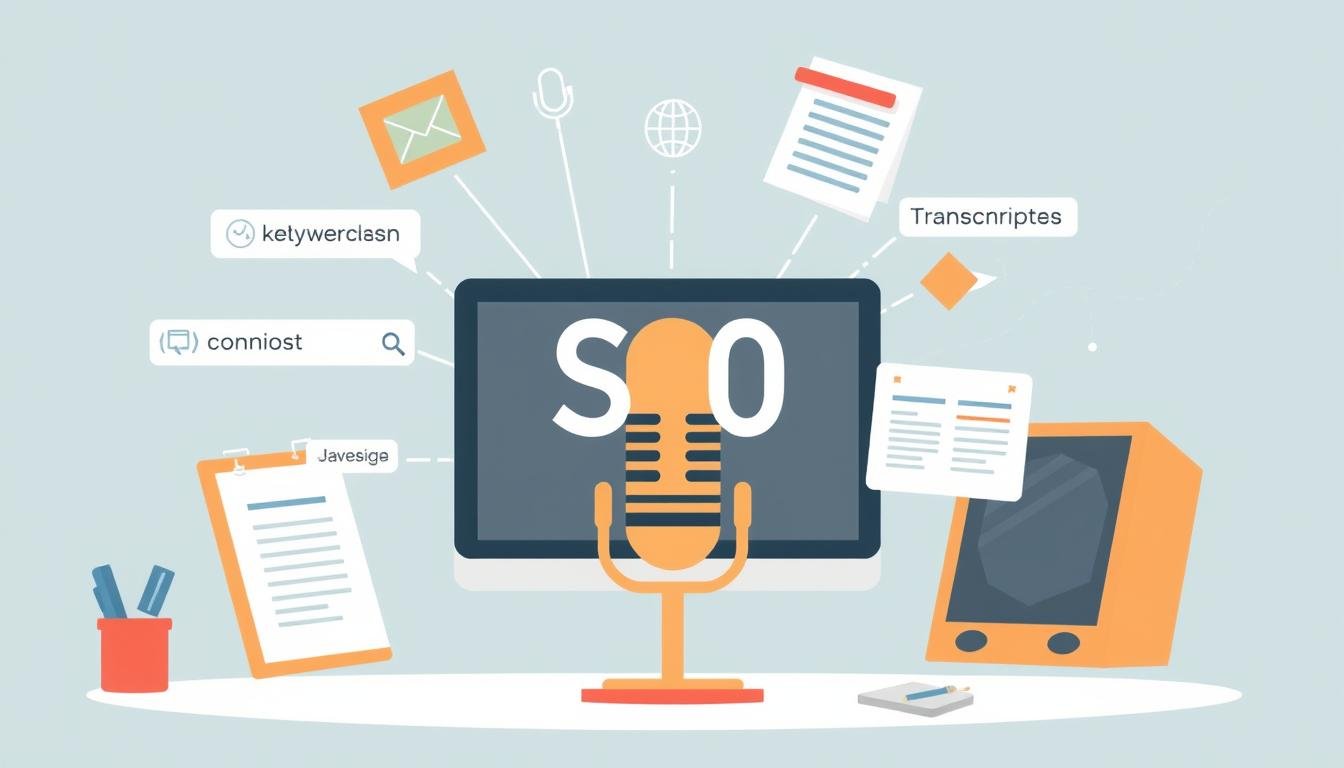Best Practices for Podcast SEO
Did you know that 40% of podcast listeners use in-app search to find new shows? This fact shows how important it is to have good podcast SEO strategies. With millions of episodes out there, podcasters need to make sure their shows are easy to find. This means optimizing them for SEO to reach more people.
This article will share the best ways to boost your podcast’s SEO. You’ll learn about keyword research, writing great episode titles, and more. By using these tips, you can make your podcast more visible and interesting to listeners online.
Key Takeaways
- Use keyword research tools to get more visibility.
- Write engaging episode titles that follow SEO guidelines.
- Add meaningful show notes to help people find your podcast.
- Use transcripts to reach more people with your content.
- Interact with your audience to build trust.
- Keep publishing content to improve your SEO.
Understanding the Importance of Podcast SEO
The podcasting world has changed a lot, growing fast and becoming a key way to share content. Back in 2006, only 22% of people in the U.S. knew about podcasts. Now, almost 80% do. This shows how competitive it is for podcasters today.
So, knowing about podcasting SEO is crucial for creators who want to be noticed.
Growth of Podcasting
As more people listen to podcasts, creators need to find their unique spot. Using good equipment like microphones and soundproofing can make their podcast sound professional. This can help them connect better with their audience and gain their trust.
SEO’s Role in Increasing Visibility
Increasing podcast visibility is key, and SEO helps a lot with that. By using the right keywords in titles and descriptions, podcasters can get higher rankings on search engines. Transcripts also help SEO by making the content easier to find.
Tools in hosting platforms let creators see how well they’re doing. This helps them make content that their audience likes. Using social media can also help build a community around the podcast.
| Year | U.S. Population Familiarity with Podcasting |
|---|---|
| 2006 | 22% |
| Today | 80% |
Best Practices for Podcast SEO
Creating a successful podcast is more than just great content. It starts with doing keyword research for podcasts. This helps you know what people are looking for. By using this info, you can make your episodes more appealing and easy to find.
Keyword Research Strategies
Keyword research is key to good podcast SEO. Tools like Google Trends and Moz help find what people are searching for. Using long-tail keywords, which are specific phrases, helps you reach a specific audience.
It’s important to make your content interesting to this audience. Topics that stay relevant over time are great. They keep bringing in listeners.
Choosing Effective Episode Titles
Great podcast titles get people to listen. They should have the right keywords but also be interesting. Adding guest names or trending topics makes your podcast more visible and attractive.
The best title is both optimized for keywords and creative. It should capture the episode’s essence and draw in listeners.
Optimizing Your Podcast’s Show Notes
Creating effective show notes is key to your podcast’s success. It helps attract new listeners and boost your search engine rankings. A concise and engaging summary draws in potential audiences and outlines your episode.
Writing Compelling Summaries
Writing summaries means capturing the main themes and takeaways of each episode. A good summary grabs potential listeners’ attention and makes them want to dive deeper. Focus on the most interesting parts and keep the language simple.
Adding calls to action, like social media links or subscription options, can also boost engagement.
Incorporating Keywords Naturally
Using keywords in your show notes boosts SEO without making it hard to read. Include strategic phrases in your summaries and descriptions, but avoid stuffing them in. This balance helps search engines find your podcast easier.
Using long-tail keywords can also improve your SEO. Here are some tips:
- Use descriptive titles that sum up the episode.
- Add links to resources mentioned in the episode.
- Use meta descriptions with main keywords.
- Optimize image names and alt-text with keywords.
- Create a table of contents for easier navigation.
| Element | SEO Benefit |
|---|---|
| Compelling Summaries | Increases listener engagement and encourages sharing. |
| Keyword Usage | Enhances search engine visibility and ranking potential. |
| Links to Resources | Boosts user engagement and provides backlinking opportunities. |
| Transcripts | Improves accessibility and creates variations for targeted keywords. |
Utilizing Transcripts for SEO Enhancement
Podcast transcription is now key for creators and marketers. It boosts podcast discoverability and makes podcasts accessible to more people. This process helps search engines index content better, improving SEO.
Benefits of Transcription for Accessibility
Transcripts are crucial for those who have trouble hearing. They make podcasts more inclusive. This means more people can enjoy the content, whether by listening or reading.
With more accessibility, podcasts reach a wider audience. Creators can connect with people who might have missed out before.
Boosting Discoverability with Written Content
Transcripts help podcasts show up in search results. This makes it easier for people to find them. They can even appear as featured snippets on search pages, boosting visibility.
Transcripts can be used in many ways. They can turn into blog posts, social media content, or emails. This strategy attracts more visitors and boosts engagement. Using the right keywords in transcripts can also help drive more traffic.
| Benefit | Description |
|---|---|
| Improved SEO | Enhances indexing by search engines, making podcasts more discoverable. |
| Expanded Accessibility | Caters to individuals with hearing impairments and those who prefer reading. |
| Diverse Content Opportunities | Allows transcripts to be used for blog posts, social media, and email promotions. |
| Higher Engagement | Increases chances for audience interaction and retention with additional written content. |
| Accurate Representation | Ensures the creator’s intended message is delivered without misunderstandings. |
Quality podcast transcription boosts SEO and improves the listening experience. It makes sure every voice is heard and valued.
Leveraging Podcast Directories and Platforms
Listing your podcast on platforms like Apple Podcasts, Spotify, and Google Podcasts is key to reaching more people. Each platform has its own audience, so knowing how to reach them can boost your visibility. By optimizing your podcast for these platforms, you can attract new listeners and make your podcast easier to find.
Getting Listed on Major Directories
To increase your podcast’s visibility, it’s important to follow the rules of major directories. Getting on these platforms means being precise and detailed. Make sure your show’s description, titles, and episode summaries are well-thought-out. Here are some steps to follow:
- Submit your podcast’s RSS feed correctly.
- Ensure that all metadata is filled out completely, including cover art that meets directory requirements.
- Regularly update your content to keep it fresh and engaging.
Benefits of Platform-Specific Optimization
Optimizing your podcast for specific platforms has many benefits. Each platform uses its own algorithms, so a customized approach helps you show up in search results. Here are some advantages:
- Increased visibility leads to more downloads and subscriptions.
- Being in popular directories gives you valuable backlinks to your website, which helps with SEO.
- Engaging with listeners through tailored descriptions can increase user interaction and loyalty.
In summary, using podcast directories effectively can greatly impact your podcast’s success. Focusing on getting listed on these platforms and optimizing your content is key to reaching a wider audience.
Encouraging Audience Engagement and Reviews
Connecting with listeners is key to building podcast community. When podcasters talk with their audience, they make people feel like they belong. This turns listeners into loyal fans. Using social media, asking for feedback, and doing Q&A can really help with audience engagement for podcasts.
Building a Community Around Your Podcast
Having a strong community is great for podcasts. Talking on social media like Facebook, Twitter, or Instagram helps connect directly with listeners. This builds a loyal group that looks forward to new episodes. Creating special groups for fans takes it to the next level.
Generating Positive Reviews for Credibility
Good reviews are super important for podcasts. They make your show more visible on places like Apple Podcasts and Spotify. Each review helps bring in new listeners. Asking fans to leave reviews can really help your podcast get noticed.
By focusing on building a community and getting reviews, podcasters can make listeners feel important and thanked.
| Strategy | Description | Benefits |
|---|---|---|
| Social Media Engagement | Regularly post updates and respond to audience interactions. | Enhances community feeling and audience loyalty. |
| Feedback Requests | Ask listeners for their thoughts on episodes via polls or surveys. | Encourages participation and improves content based on audience preferences. |
| Ratings and Reviews | Invite listeners to leave reviews after new episodes. | Boosts credibility and increases discoverability on major platforms. |
Conclusion
In today’s digital world, making podcasts easy to find online is key. Using the right keywords, catchy titles, and detailed show notes helps a lot. This strategy is crucial for podcast creators as podcasts are growing fast.
Adding transcripts also helps people find your podcast. It matches how Google indexes audio content. Tools like Otter, Rev, and Temi make writing transcripts easy. This lets podcasters focus on making great episodes and getting better search rankings.
By using these tips, you can reach more people and even make money as your audience grows. A good SEO plan means more listeners, more engagement, and more chances to earn.
Following these steps helps your podcast show up in regular search results, not just podcast platforms. A smart keyword strategy and clear descriptions help you stand out. A full SEO plan is key for lasting success in podcasting.
Source Links
- Podcast SEO 101: How to Rank Higher
- SEO for Podcasts: Everything You Need to Know | Castos
- 10 Best Practices for Optimising Your Podcast SEO
- The Complete Guide to Podcast SEO
- Best Practices for Podcast SEO | Ausha Blog
- Podcast SEO: 10 Tips from our SEO Podcasting Expert | Captivate
- Podcast SEO: Top tips for discovery and growth
- Podcast SEO: 10 For Sure Ways to Boost Rankings
- Podcast SEO best practices
- Podcast Show Notes SEO: How to Rank a Podcast
- How to optimize your podcast show notes for SEO (from an SEO expert)
- Podcast transcription: Transforming spoken content into SEO-friendly text
- Integrating Podcast Transcripts into Your Content Strategy: Tips and Best Practices
- Why Accurate Podcast Transcripts Matter: Enhancing Listener Experience and Engagement
- Best Practices for Podcast SEO – Pilot Digital
- Podcast SEO: Optimize Your Podcast for Maximum Reach | Ausha
- Podcast SEO: How to Make Your Show Discoverable
- Podcast Content Marketing: Best Practices for Growing Your Audience
- Enhancing Your Podcast’s Reach with Strategic Podcast SEO
- Podcast SEO Guide: Rank Higher on Google | Lauren Taylar
- Podcast SEO 101: Everything a Marketer Needs to Know
- SEO for Your Podcast: 6 Best Practices – Independent Podcast Network








